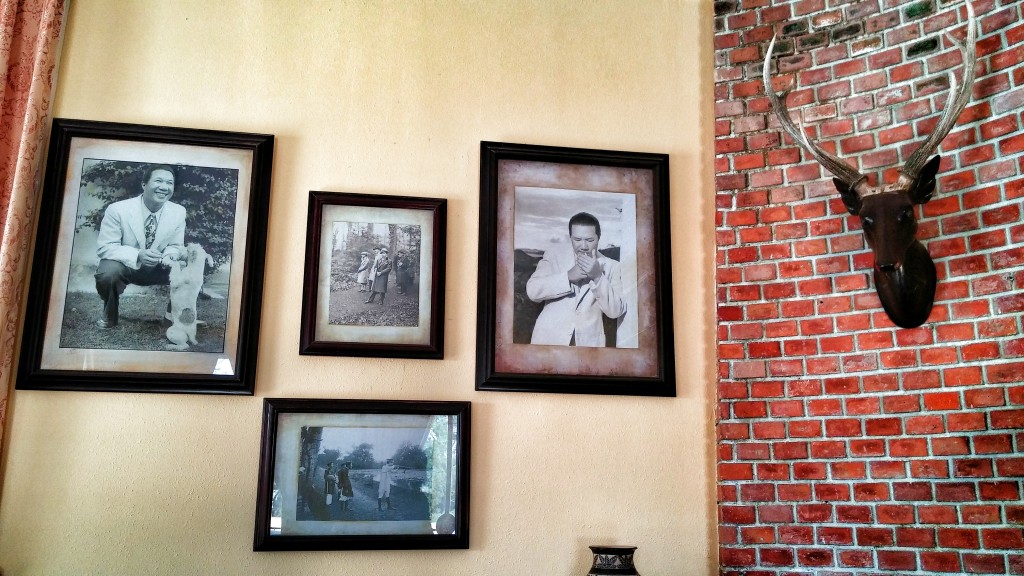The Last Emperor: Bao Dai

Who wouldn’t want a personal escape helicopter?
I mean, how far off from a Bond Villain are you then? You’d just need a cat (and maybe a scar).
As I stand in the man’s bedroom I wonder if all the secret escape tunnels and machine guns made Bao Dai, the last emperor of Vietnam, sleep any more soundly at night?
Should he hear the sudden rush of footsteps on the thick carpet, the clatter of rifles on the marble staircase, he could maybe, just maybe, get away.
Leaping from his plush imported bed he would have only a moment before they would be at his door.
His wife, the empress, is asleep across the hall, and his aged mother next door. Does he wake them? Does he have time? Would the Communists that have come this far to execute the emperor also execute his family?

He would have very little time to make it into the small hidden passage leading from his upstairs personal apartments to the armed American helicopter on the pad behind the lush garden.

Assuming the coup had not infiltrated his American-trained pilots, Bao Dai, the young emperor of the beleaguered State of Vietnam, might be able to lift off from his mountain palace in the cool highlands of Dalat. He might be able to make it south to a French or American airbase. From there the easy escape to the bountiful French Riviera, to live out a life of regal exile.
As I sit in the bedroom of the man, my muddy boots covered in museum issue booties, I wonder what he must have thought at night. Staring up at that yellow plaster ceiling, the Gramaphone in the corner ticking over, having finished one of the dusty jazz records.
‘Was it all over?’
‘Did I really end it?’
As the soon to be deposed 13th Emperor of the Ngyuen dynasty he must have seen the curtains closing in. Though dynastic lords had ruled Vietnam since the time of Christ this was a different time and a different people. Nationalists and Communists, bolstered by China, were calling for his abdication.
It’s gotta be rough for the guy in history who fucks it up. The guy who drops the ball. The guy who sells the land for shiny beads. The guy who doesn’t get the patent. The guy who loses the war. What does history make of these people in hindsight?
They’re generally ridiculed, picked apart by armchair historians, and perhaps it’s warranted, yet time changes heroes to villains then back again over it’s course, and understanding a persons innermost thoughts is nearly impossible.
Traveling Vietnam one tries to understand ‘The War’. It is the central event of recent cultural memory and has the most long lasting effects, from Starbucks to Dioxin poisoning.
Bao Dai became emperor at the wrong time. A few hundred years earlier and he’d be neck deep in concubines, growing rich of the opium trade with China. Instead he was thrust at a young age into the cultural meat grinder of the Cold War.
 Ho Chi Minh’s face is everywhere. He hangs prominently in public spaces and on banners.
Ho Chi Minh’s face is everywhere. He hangs prominently in public spaces and on banners.
His wise likeness adorns keychains and buttons, sold by old ladies next to piles of American GI dog tags. Veneration. The Communists do it well. His mausoleum is a mummified testament to a man who asked that he be cremated traditionally.
Bao Dai’s face is nowhere but in the faded snapshots that adorn his various sitting rooms. Gilded in finery on his ascension to the throne as a teenager. Stuffed uncomfortably into the starched britches of a Parisian boarding school. Then the good times. The moment where it must have been amazing to be the young emperor of a temporarily stable country.

Powder muskets, of the size I’d imagine it would require to kill an Elephant, hang where people nowadays would put the flat screen. Pictures of the kills show a beaming young man, suited in Western attire, smoking and laughing his way through his brief reign.
Perhaps this indulgence was not the best upbringing for a leader. When given the choice between continuing his lavish lifestyle abroad, or diving into the bloody privation that was surely seen to be coming, his choice was as obvious as it was disastrous – The beginnings of the Second Indochina, or ‘Vietnam’ War.
Feeling not up to the task of uniting a fractured country behind his tarnished throne, he left, perhaps taking his final flight from this very bedroom. Whisked away to reign in exile from aboard a yacht in the Monaco harbour.
Understanding history is difficult. The haze of time and a detachment to the subject can make even the most interesting places and people fall flat. To go someplace, snap a photo, read a placard and leave – it’s the most efficient way of checking cultural boxes, but without context it simply scratches the surface.
There’s no way I can understand this man. I’ll never know or understand the weight and expectation thrust upon someone like that. I can stand in his bedroom, leafing through the books left on his nightstand but I can’t guess what he thought of them.
I can only sit, looking up at the crack above the bed, a crack he must have watched and memorized each night before a fitful sleep, and think, I would have felt much safer with the escape helicopter.






